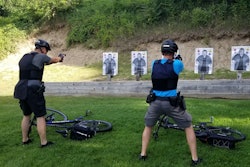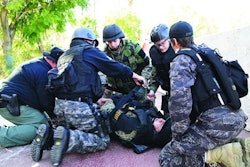Late last month, the American Civil Liberties Union (ACLU) of Arizona—along with nearly a dozen media organizations—filed a lawsuit against a law in the state prohibits making a video recording within eight feet of police engaged in "a law enforcement activity."
The law—HB 2319—states that it is "unlawful for a person to knowingly make a video recording of law enforcement activity if the person making the video recording is within eight feet of where the person knows or reasonably should know that law enforcement activity is occurring."
The aim of the law—according to Arizona State Representative John Kavanagh, who sponsored the legislation—is to put a "buffer" between police and people with cameras (or, more accurately, camera-enabled mobile devices such as phones and tablet computers) who might interfere with police business, or endanger officers and innocent bystanders in the area.
The ACLU contends that the law violates the First Amendment to the Constitution and that "video recording of police encounters and other law enforcement activity in public is one of the few ways community members and the media can hold police accountable for misconduct."
The rights group and the media argue that any such eight-foot safety perimeter would be all but impossible to maintain in a crowded setting like a public protest (read: riot).
It's unclear whether or not the law will be upheld—although it's a fairly safe wager to put money on the ALCU winning this one—but it does give rise to thoughts on ways in which police trainers can help officers better contend with the ubiquity of cell-phone video, social media posts, and anti-police feeling.
Why not add mobile phone cameras into existing training exercises?
Practice How You Play
"You play like you practice if you practice how you play."
This quote—and other variants—have been attributed to so many people it's impossible to trace its origin, but its accuracy is unquestioned. If officers train with mobile phone cameras capturing their every move in training and simulated scenarios, they will most likely have some level of inoculation against any distraction they present when they're working the same situations on the street.
However, introducing this added element into already complex training regimes would require some thoughtfulness and intentionality written into the training manual itself, so that the new practice wouldn't become prey to misuse and misappropriation. Any such new practice should include—but not be limited to—careful consideration to the specifically defined purpose of the video recording and the period of time the recordings are retained.
Let's consider each in turn.
1. Defined Purpose
The purpose of introducing role players into scenario-based training should be limited to simulating the type of distraction and/or interference this activity can create. The video captured—if any, because inert training devices could be used in place of actual recording technology—should not be used for de-brief of the exercise unless the interaction with the role player holding the camera is an intended element to the training cycle.
2. Restricted Retention
The inclusion of this sort of simulation should explicitly prohibit the retention of any captured video beyond its immediate usefulness in the training cycle itself. Role players should model the behavior of a typical person on the street, but the video itself video serves no useful purpose beyond creating appropriate stress inoculation to prepare officers for what they are sure to encounter on the street and should be destroyed before everyone packs up and goes home for the day.
All the World's a Stage
The nexus of cellphone videos, social media posts, and anti-police sentiment will ensure that an increasing number of police-citizen contacts will be either broadcast live on the Internet, recorded for later consumption, or both.
William Shakespeare famously wrote in Act 2, Scene 7 of As You Like It:
All the world's a stage...
And all the men and women merely players.
They have their exits and their entrances...
And one man in his time plays many parts...
His acts being seven ages.
If indeed all the world's a stage, then police training in the video age could potentially benefit from being a little more like rehearsal for an anticipated premiere before a theater audience—or at least a showing on wall-mounted wide-screen plasma television in the family room.
















